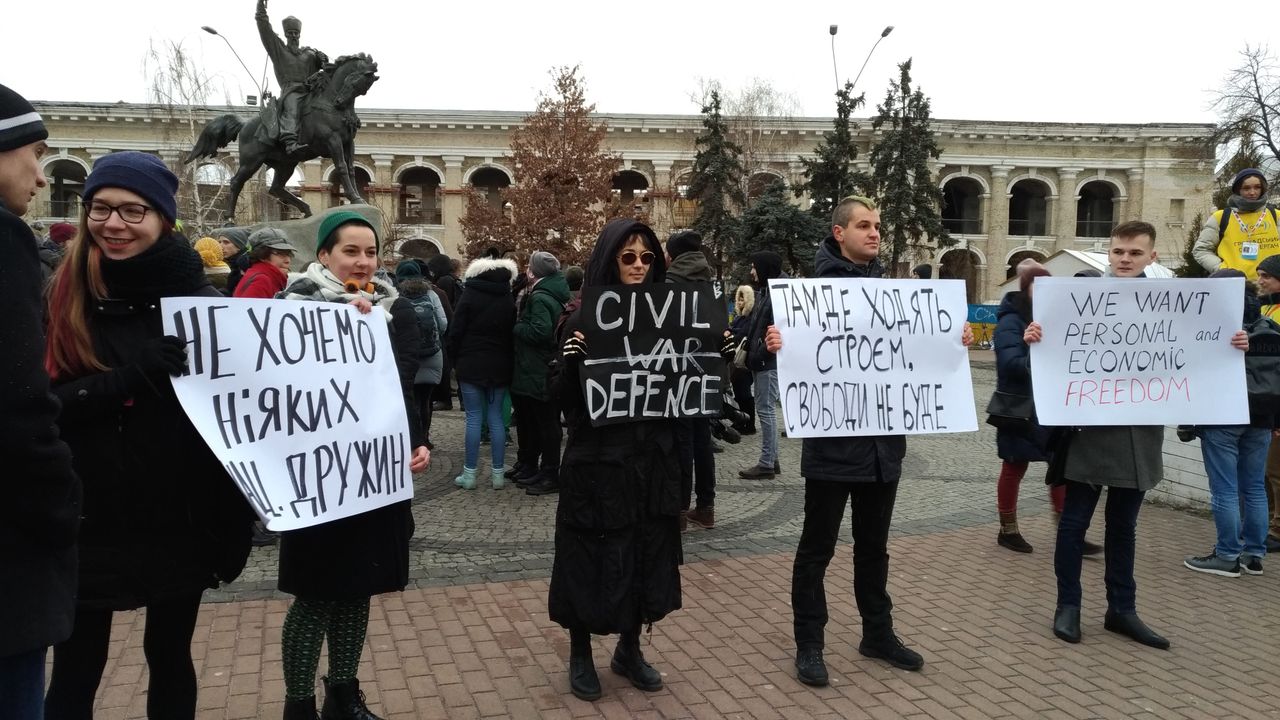The “Azov movement”
The so-called “Azov movement” formed in spring 2014 from the volunteer battalion "Azov", which was one of the first volunteer troops to take part in the battles in the east of Ukraine. Its commander was Andriy Biletsky, born in 1979 in Kharkiv. He has been involved in the nationalist movement for years. In 2006, he was the head of an extremely nationalistic organization "Patriot of Ukraine".
In the photographs: Andriy Biletsky
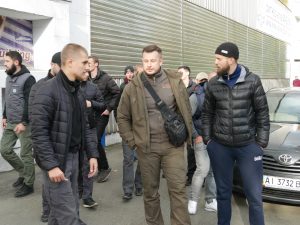
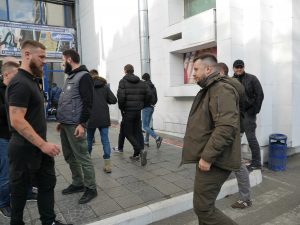
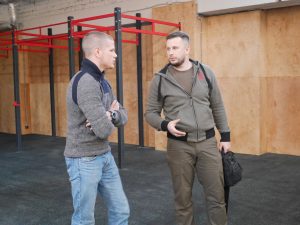 On May 16, 2014, "Azov", with the support of Ukrainian army troops, carried out a successful operation of the liberation of Mariupol, which was then under the control of pro-Russian fighters. In August 2014, the “Azov” battalion took part in the battle of Ilovaisk and from the end of September 2014 it fought in Mariupol.
In photographs: soldiers of the "Azov" battalion defending Mariupol
On May 16, 2014, "Azov", with the support of Ukrainian army troops, carried out a successful operation of the liberation of Mariupol, which was then under the control of pro-Russian fighters. In August 2014, the “Azov” battalion took part in the battle of Ilovaisk and from the end of September 2014 it fought in Mariupol.
In photographs: soldiers of the "Azov" battalion defending Mariupol
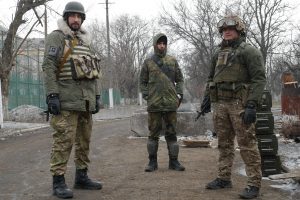
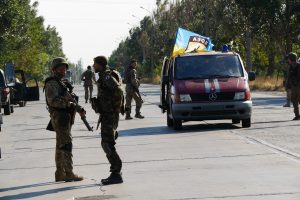
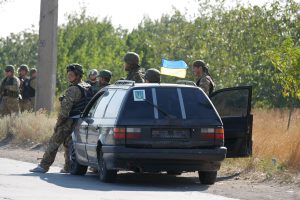 In September 2014, battalion was transformed into a regiment, and on November 10, 2014, it was included in the National Guard structures by the order of the Minister for Internal Affairs, Arsen Avakov.
Back then the information appeared in the press that many soldiers of "Azov" had extremely nationalistic views.
In the spring of 2015, the socio-political organization "Azov" was established. It gathered former soldiers of the "Azov" regiment and people with nationalist beliefs. It was involved in volunteering and patriotic and sport upbringing. The corps organized sports and military camps for children and youth in many regions of Ukraine. Competitions in martial arts took place under the banner of "Azov".
In September 2014, battalion was transformed into a regiment, and on November 10, 2014, it was included in the National Guard structures by the order of the Minister for Internal Affairs, Arsen Avakov.
Back then the information appeared in the press that many soldiers of "Azov" had extremely nationalistic views.
In the spring of 2015, the socio-political organization "Azov" was established. It gathered former soldiers of the "Azov" regiment and people with nationalist beliefs. It was involved in volunteering and patriotic and sport upbringing. The corps organized sports and military camps for children and youth in many regions of Ukraine. Competitions in martial arts took place under the banner of "Azov".
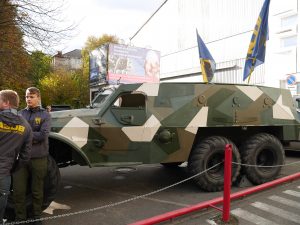
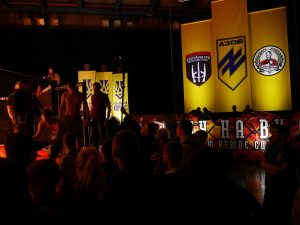
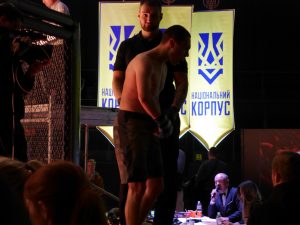 Media accused some members of the corps of Nazis and racist beliefs. They were also suspected of organizing assaults on their political opponents.
In October 2016, the formation of the National Corps party was announced. The leader of the party was the former commander of the "Azov" regiment and a member of the Verkhovna Rada, Andriy Biletsky. The National Corps, as the name suggests, is a nationalist party of a leadership nature. Its program points out some antagonism between Russia and Europe. Interestingly, it also includes the idea of an Intermarium, according to which Ukraine should be a part of the new Baltic-Black Sea Alliance, along with Poland and the Baltic Sea states. Ukraine should also renew its nuclear capability.
Media accused some members of the corps of Nazis and racist beliefs. They were also suspected of organizing assaults on their political opponents.
In October 2016, the formation of the National Corps party was announced. The leader of the party was the former commander of the "Azov" regiment and a member of the Verkhovna Rada, Andriy Biletsky. The National Corps, as the name suggests, is a nationalist party of a leadership nature. Its program points out some antagonism between Russia and Europe. Interestingly, it also includes the idea of an Intermarium, according to which Ukraine should be a part of the new Baltic-Black Sea Alliance, along with Poland and the Baltic Sea states. Ukraine should also renew its nuclear capability.
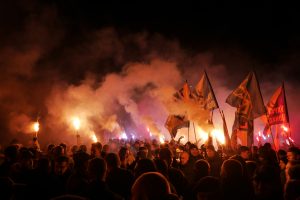
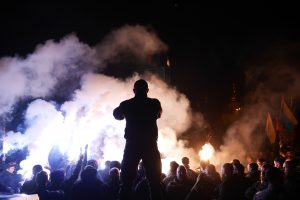



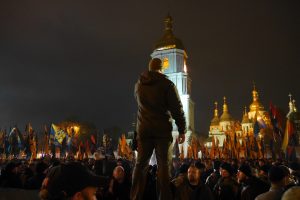
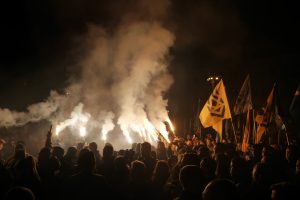 On January 29, 2018, the National Teams' paramilitary organization also became a part of the Azov movement.
On January 29, 2018, the National Teams' paramilitary organization also became a part of the Azov movement.


 On May 16, 2014, "Azov", with the support of Ukrainian army troops, carried out a successful operation of the liberation of Mariupol, which was then under the control of pro-Russian fighters. In August 2014, the “Azov” battalion took part in the battle of Ilovaisk and from the end of September 2014 it fought in Mariupol.
In photographs: soldiers of the "Azov" battalion defending Mariupol
On May 16, 2014, "Azov", with the support of Ukrainian army troops, carried out a successful operation of the liberation of Mariupol, which was then under the control of pro-Russian fighters. In August 2014, the “Azov” battalion took part in the battle of Ilovaisk and from the end of September 2014 it fought in Mariupol.
In photographs: soldiers of the "Azov" battalion defending Mariupol


 In September 2014, battalion was transformed into a regiment, and on November 10, 2014, it was included in the National Guard structures by the order of the Minister for Internal Affairs, Arsen Avakov.
Back then the information appeared in the press that many soldiers of "Azov" had extremely nationalistic views.
In the spring of 2015, the socio-political organization "Azov" was established. It gathered former soldiers of the "Azov" regiment and people with nationalist beliefs. It was involved in volunteering and patriotic and sport upbringing. The corps organized sports and military camps for children and youth in many regions of Ukraine. Competitions in martial arts took place under the banner of "Azov".
In September 2014, battalion was transformed into a regiment, and on November 10, 2014, it was included in the National Guard structures by the order of the Minister for Internal Affairs, Arsen Avakov.
Back then the information appeared in the press that many soldiers of "Azov" had extremely nationalistic views.
In the spring of 2015, the socio-political organization "Azov" was established. It gathered former soldiers of the "Azov" regiment and people with nationalist beliefs. It was involved in volunteering and patriotic and sport upbringing. The corps organized sports and military camps for children and youth in many regions of Ukraine. Competitions in martial arts took place under the banner of "Azov".


 Media accused some members of the corps of Nazis and racist beliefs. They were also suspected of organizing assaults on their political opponents.
In October 2016, the formation of the National Corps party was announced. The leader of the party was the former commander of the "Azov" regiment and a member of the Verkhovna Rada, Andriy Biletsky. The National Corps, as the name suggests, is a nationalist party of a leadership nature. Its program points out some antagonism between Russia and Europe. Interestingly, it also includes the idea of an Intermarium, according to which Ukraine should be a part of the new Baltic-Black Sea Alliance, along with Poland and the Baltic Sea states. Ukraine should also renew its nuclear capability.
Media accused some members of the corps of Nazis and racist beliefs. They were also suspected of organizing assaults on their political opponents.
In October 2016, the formation of the National Corps party was announced. The leader of the party was the former commander of the "Azov" regiment and a member of the Verkhovna Rada, Andriy Biletsky. The National Corps, as the name suggests, is a nationalist party of a leadership nature. Its program points out some antagonism between Russia and Europe. Interestingly, it also includes the idea of an Intermarium, according to which Ukraine should be a part of the new Baltic-Black Sea Alliance, along with Poland and the Baltic Sea states. Ukraine should also renew its nuclear capability.






 On January 29, 2018, the National Teams' paramilitary organization also became a part of the Azov movement.
On January 29, 2018, the National Teams' paramilitary organization also became a part of the Azov movement.